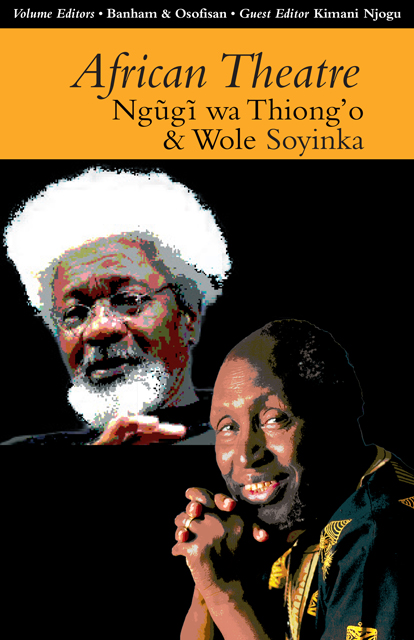Book contents
- Frontmatter
- Contents
- Notes on Contributors
- Obituary of Pat Amadu Maddy
- Introduction
- Reading & Performing African Drama: How Wole Soyinka & Ngũgĩ wa Thiong’o influenced my work
- Ayan Contra Ujamaa: Soyinka & Ngũgĩ as theatre theorists
- Encounters with Soyinka
- Encounters with Ngugi
- Wole Soyinka & Ngũgĩ wa Thiong’o: Plays in Production
- The Making of The Trial of Dedan Kĩmathi by Ngũgĩ wa Thiong’o & Mĩcere Gĩthae Mũgo at the University of California, Irvine: A personal reflection
- Playscript: A Rain of Stones
- Book Reviews
Ayan Contra Ujamaa: Soyinka & Ngũgĩ as theatre theorists
Published online by Cambridge University Press: 23 February 2023
- Frontmatter
- Contents
- Notes on Contributors
- Obituary of Pat Amadu Maddy
- Introduction
- Reading & Performing African Drama: How Wole Soyinka & Ngũgĩ wa Thiong’o influenced my work
- Ayan Contra Ujamaa: Soyinka & Ngũgĩ as theatre theorists
- Encounters with Soyinka
- Encounters with Ngugi
- Wole Soyinka & Ngũgĩ wa Thiong’o: Plays in Production
- The Making of The Trial of Dedan Kĩmathi by Ngũgĩ wa Thiong’o & Mĩcere Gĩthae Mũgo at the University of California, Irvine: A personal reflection
- Playscript: A Rain of Stones
- Book Reviews
Summary
Ayanlaja and Ayangbemi: the poetics of a longue durée of expertise and mastery
Ayan is the Yoruba god of music and patron deity of the arts of drumming. His name stands as a prefix in the patronymics of families and lineages either devoted in earlier times to his worship or descended from great practitioners of the art and practice of drum music: Ayanniyi, Ayandele, Ayanlaja, Ayanwole, Ayanbiyi. Like many other African peoples, music was and remains a central aspect of the ritual, festive and daily lives of Yorubas. For this reason, Ayan, the god of music, is one of the most ubiquitous deities in the Yoruba pantheon, even though he is not as widely acknowledged and celebrated as those other great male and female deities of the Orisa tradition like Ogun, Sango, Ifa, Orunmila, Osun, Oya and Yemoja. Two of the Ayan-derived patronymics that I find particularly illustrative of the values and significations associated with this god are Ayanlaja (Ayan resolves conflicts; he brings peace to warring individuals and groups) and Ayangbemi (I have found favour in the god; in Ayan, my blessings are manifold). In these names are great conceits, perhaps even fabulous catechisms: music, under the patronage of Ayan, can bring peace to a troubled world and can serve as the ultimate beatitude for an individual or a people.
To the extent that music is an essential part of the worship of all the deities, Ayan as patron god of music is indispensable to the worship of all the deities. Once, in a rare find in the archives of the Music Library of Cornell University, I discovered recordings by William Bascom from the early 1950s of the musical repertoire associated with each of the principal Yoruba deities, complete with glosses written by the great cultural anthropologist himself. In each case, the musical performance was done by some of the most celebrated Bata and Dundun musical groups of the period.
At the climax of ritual worship when a god manifests himself or herself through a possessed devotee, Ayan is the agent, the medium of the epiphany. This is achieved not haphazardly but with great attention to pacing, timbre, tonality and nuance in the orchestration of the music, for the drummers, singers and chanters are highly trained and very skilful performers.
- Type
- Chapter
- Information
- African Theatre 13Ngugi wa Thiong'o and Wole Soyinka, pp. 8 - 14Publisher: Boydell & BrewerPrint publication year: 2014



